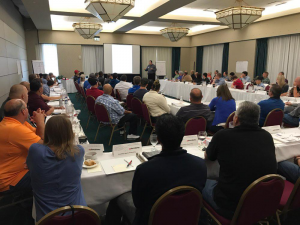High attendance at the RefComm® Galveston 2017 refinery conference (May 8-12) reflects the industry’s appetite for embracing the latest Best Practices for running primary process units. Against this backdrop, it was no surprise to many of the delegates that running money-making units like the FCC for 5 – 6 years is feasible, but can it be repeated safely at other facilities?
In the interest of safety, the argument can be made that four-year run lengths are more practical, considering that just one key piece of rotating equipment, such as the FCC’s wet gas compressor, can shut down the entire operation, as mentioned by several speakers. Nonetheless, many equipment assets that may be causing problems won’t necessarily lead to an imminent unit shutdown, such as fouled heat exchangers, and can be repaired or replaced at the end-of-run. While none of these paradigms are new to the industry, the “tools” now available to refiners is what makes the narrative more compelling, which is where RefComm® Galveston 2017 serves as a forum for making engineers and operators aware of these tools.
The important take-aways from RefComm revolve around meeting refined product demand with operational improvements that circumvent capital expenditure. This theme was shared by many of the presenters at the Galveston meeting. For example, all the “touch points” worthy of consideration in the normal operation of the FCC, coker and sulfur units were open to discussion.
Depending on technology supplier, there is more than one solution to every operational problem. Take for example, overcoming main air blower (MAB) constraints, several companies presented strategies for overcoming MAB limits, from remote monitoring and proactive maintenance strategies to seasonal solutions that preserve MAB capacity during hot summer time ambient conditions. Case in point: Aggreko, a mobile power solutions provider, presented real results from a West Coast refinery where they resolved MAB constraints without CAPEX.
In this instance, Aggreko’s Advanced Process Services (APS) helped one refiner by taking advantage of its inventory of mechanical chillers to cool down MAB inlet air from hot summer temperatures of 105 °F to almost 60 °F. This 45 degree cool down delivered denser air with higher wt% O2 to the regenerator for efficient coke burn off. This is just one of conference’s many focal points where defining the boundaries around specific challenges such as maximum air utilization, reactor/regenerator pressure balances, main fractionator tower flooding, etc., were at the forefront of operators’ concerns.
Other refiners attending the Galveston meeting, after having already invested significant CAPEX, were more concerned with how to best utilize their high complexity assets to meet the plethora of market and regulatory challenges, such as Tier 3 gasoline specifications and the impending IMO 2020 Global Sulfur Cap of 0.5 wt% in marine fuels. The fuel quality targets are achievable from a processing perspective, but the real value to RefComm delegates concerned with these topics are uncovering the best operational strategies to leverage, such as with their hydrotreaters for reducing sulfur below 10 ppm while avoiding octane loss. Going forward, these topics will continue to be relevant and discussed at the October 2 -6 RefComm® Budapest 2017 refinery conference (https://refiningcommunity.com/refcomm-budapest-2017/).
One response to “RefComm® Galveston 2017 Conference Draws Diverse Crowd”
Leave a Reply
You must be logged in to post a comment.








Presentations from RefComm® Galveston 2017 and previous conferences are available at https://refiningcommunity.com/past-presentations/.
#refcomm